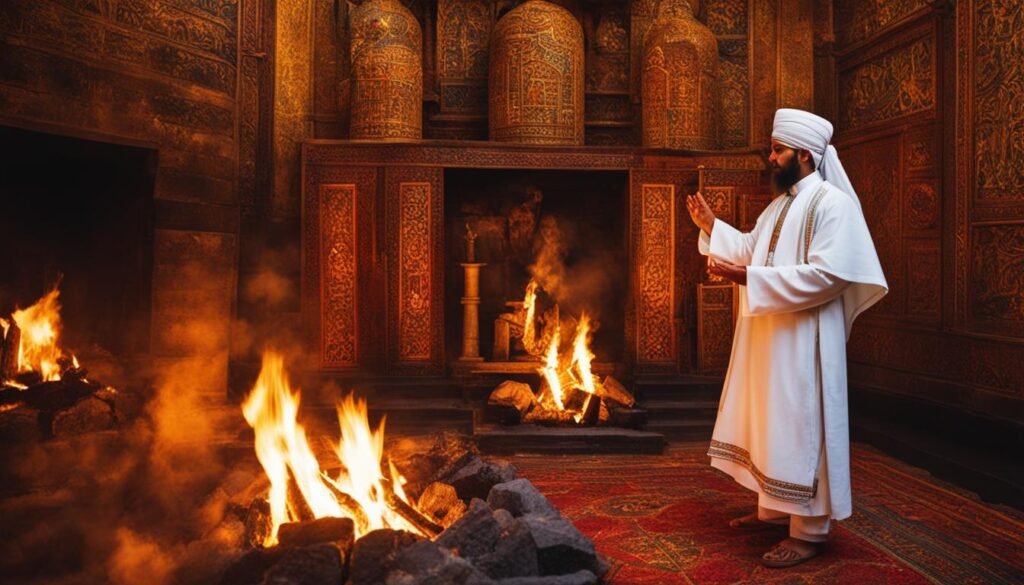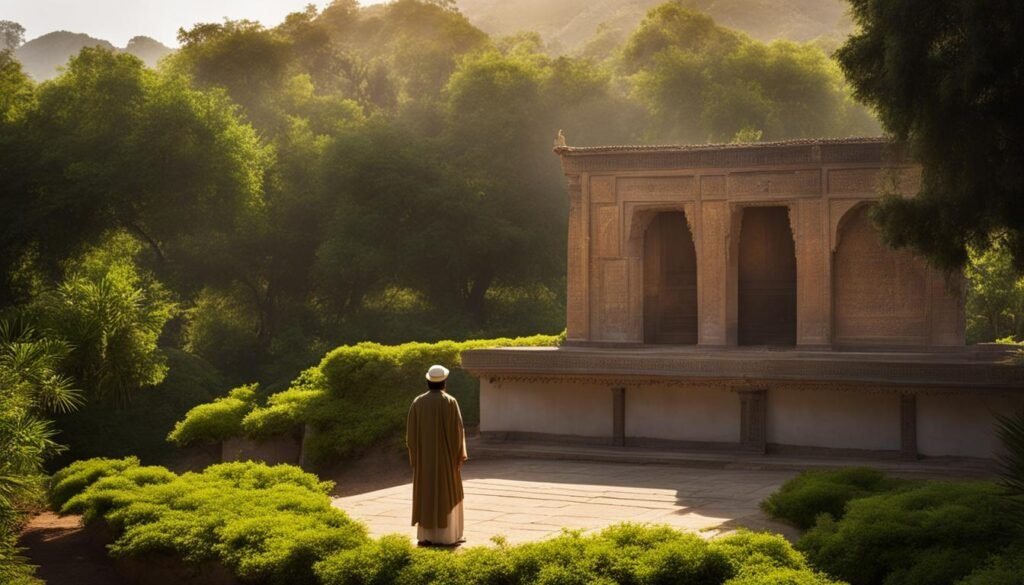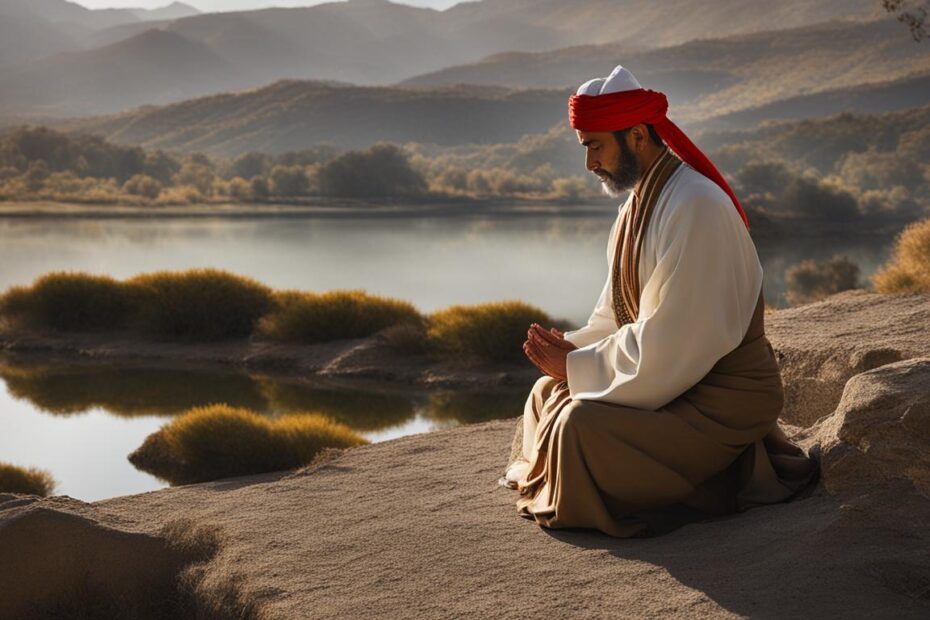Zoroastrianism, an ancient faith that originated from the teachings of the prophet Zarathushtra, places a strong emphasis on prayer. Prayers hold immense significance in the religious practices of Zoroastrianism, serving as a means for followers to connect with the divine, seek guidance, and express their devotion. These prayers encompass various aspects of life, including healing, protection, guidance, peace, and prosperity, reflecting the diverse needs and aspirations of Zoroastrians.
Key Takeaways:
- Zoroastrianism places great importance on prayer as a way to connect with the divine.
- Prayers in Zoroastrianism serve various purposes, including healing, protection, guidance, peace, and prosperity.
- Zoroastrian prayers are accompanied by specific rituals and traditions.
- Zoroastrianism continues to cherish its prayer traditions despite modern challenges.
- Prayer in Zoroastrianism is a means for followers to express their devotion and seek divine intervention.
The Importance of Prayer in Zoroastrian Beliefs
Prayer is considered a vital part of Zoroastrian beliefs. It is seen as a means to establish a connection with the divine and to seek divine blessings. Zoroastrians have specific rituals and ceremonies associated with prayer, such as reciting prayers from the Khordeh Avesta, a collection of Zoroastrian prayers and rituals. The prayer ceremony involves the use of fire, which is considered sacred in Zoroastrianism, and the recitation of verses from the Avesta.
Prayer in Zoroastrianism is not merely a request for personal favors but a way to align oneself with the divine order and seek spiritual growth. It is believed that through prayer, followers can purify their thoughts, words, and actions, fostering a deeper connection with Ahura Mazda. The prayers from the Khordeh Avesta cover various aspects of life, including gratitude, guidance, protection, and healing. They serve as a guide for believers in navigating the complexities of daily life while upholding the values and teachings of Zoroastrianism.
Prayer is the key to understanding and experiencing the divine presence in our lives. It is the channel through which we can seek spiritual enlightenment and communicate with Ahura Mazda, the embodiment of truth and righteousness.
The Zoroastrian prayer rituals are rich in symbolism and significance. The presence of fire during prayer ceremonies represents the eternal flame of Ahura Mazda, symbolizing purity and divine energy. The recitation of sacred verses, accompanied by gestures such as humata, hukhta, and hvarshta, reinforces the connection between the physical and spiritual realms. These rituals and practices create a sacred space where believers can focus their intentions and express their devotion to Ahura Mazda.
| Prayer Rituals and Ceremonies | Description |
|---|---|
| Yasna | A major Zoroastrian prayer ceremony consisting of the recitation of selected hymns from the Avesta. It involves offerings to the fire and the performance of various rituals. |
| Muktad | An annual 10-day period of remembrance for the departed souls. Prayers and rituals are performed to honor and remember them. |
| Gahanbar | A series of seasonal festivals that celebrate different aspects of creation. Prayers, feasts, and acts of charity are performed during these festivals. |
| Padyab and Afringan | Rituals involving the sprinkling of holy water and offering of prayers for purification and protection. |
These prayer rituals and ceremonies form an integral part of the Zoroastrian religious practice, providing believers with a framework for spiritual connection, self-reflection, and the pursuit of righteousness. Through prayer, Zoroastrians seek to align their lives with the divine will and contribute to the betterment of themselves and the world around them.
Zoroastrian Prayers for Healing and Protection
Zoroastrianism includes prayers for healing and protection, reflecting the belief in the power of prayer to invoke divine intervention and safeguard against harm. One of the prominent prayers for healing in Zoroastrianism is the Do’e Tandorosti, which is recited to seek good health for oneself, family, and friends. This prayer emphasizes the importance of physical and spiritual well-being, calling upon Ahura Mazda’s blessings for overall wellness.
In addition to prayers for healing, Zoroastrians also offer prayers for protection. These prayers are meant to seek divine guidance and shield individuals from negative influences and potential harm. Through prayer, followers of Zoroastrianism express their trust and faith in Ahura Mazda’s ability to safeguard them in their daily lives.
The significance of these prayers for healing and protection is deeply rooted in the teachings of Zoroastrianism. By engaging in prayer, individuals not only seek personal well-being but also connect with the divine and embrace the values of righteousness, purity, and harmony.
| Prayer | Purpose |
|---|---|
| Do’e Tandorosti | To seek good health for oneself, family, and friends |
| Prayers for protection | To seek divine guidance and safeguard against negative influences or harm |
Through these prayers, Zoroastrians reinforce their belief in the interconnectedness of the physical and spiritual realms and their dependence on Ahura Mazda’s benevolence for their well-being.

Ahura Mazda, grant us healing and strength, guide us in the path of righteousness, and protect us from all harm.
Zoroastrian Prayers: Seeking Guidance and Blessings
Within the context of Zoroastrianism, prayers serve as a means for followers to seek divine guidance and blessings in their lives. These prayers are deeply rooted in the belief that through their devotion, individuals can connect with Ahura Mazda, the supreme deity in Zoroastrianism. One significant prayer for seeking guidance is the Yatha ahu vairyo, attributed to Asho Zarathushtra, which emphasizes the importance of a good mind and the authority to protect the oppressed. This prayer reflects the desire for wisdom, clarity, and divine guidance, essential for navigating life’s challenges.
In addition to seeking guidance, Zoroastrian prayers also express the longing for blessings from Ahura Mazda. These blessings encompass various aspects of life, including spiritual well-being, success, and prosperity. Zoroastrians believe that through prayer, they can align themselves with the divine order and receive blessings that bring goodness and righteousness into their lives. The prayers for blessings resonate with the overarching belief in the power of prayer to invoke the benevolence and favor of Ahura Mazda.
The significance of prayers for guidance and blessings in Zoroastrianism underscores the faith’s emphasis on the individual’s agency and active participation in seeking a spiritual connection. By engaging in these prayers, followers aim to cultivate a deeper understanding of their purpose and place in the world while seeking the divine wisdom necessary to lead a righteous and fulfilling life.
Table: Prayers for Guidance and Blessings in Zoroastrianism
| Prayer | Purpose |
|---|---|
| Yatha ahu vairyo | Seeking wisdom, clarity, and the authority to protect the oppressed |
| Various prayers from the Khordeh Avesta | Invoking blessings for spiritual well-being, success, and prosperity |
These prayers represent the deep-rooted faith of Zoroastrians in the power of prayer to connect with Ahura Mazda and seek divine guidance and blessings. The act of prayer is seen as an active and integral part of a believer’s spiritual journey and serves as a constant reminder of the presence of the divine in their lives.
Zoroastrian Prayers for Peace and Prosperity
Zoroastrianism, an ancient faith rooted in the teachings of Zarathushtra, encompasses prayers for peace and prosperity. These prayers reflect the deep-rooted belief in the power of prayer to bring about positive change and create harmony in individuals and societies. One such prayer is the Gathas Song 17.8, which calls for an end to violence, diseases, and the protection of life. It emphasizes the importance of upholding righteousness and seeking peace in the world.
“Let not violence and disease approach us or the world.
Protect us from all that is harmful.”
Zoroastrians offer prayers for peace to invoke Ahura Mazda’s blessings and to foster a peaceful coexistence among all beings. These prayers highlight the interconnectedness of individuals and their responsibility to contribute to a harmonious society. Zoroastrian prayers for prosperity also form an integral part of the faith, seeking abundance and well-being in various aspects of life.
In Zoroastrianism, prayers for prosperity encompass both material and spiritual prosperity. Through prayer, followers seek the divine blessings of Ahura Mazda to experience growth, abundance, and success. These prayers recognize the importance of balance and righteous living in attaining prosperity, both in material wealth and spiritual fulfillment.
Zoroastrian Prayer for Peace
The Gathas Song 17.8 is a powerful prayer for peace in Zoroastrianism. It expresses the desire to overcome violence, eradicate diseases, and safeguard life. This prayer embodies the emphasis on peace and the belief that prayer can be a catalyst for positive change:
“May we overcome violence and diseases,
and may we protect and cherish all forms of life.”
This prayer serves as a reminder of the responsibility to create a peaceful world and promote understanding among individuals. It calls for compassion, unity, and the elimination of suffering, envisioning a society where peace prevails.
Through prayers for peace and prosperity, Zoroastrians strive to manifest their faith’s core values of righteousness, harmony, and the well-being of all. These prayers serve as a way to express devotion, seek divine blessings, and actively contribute to a more peaceful and prosperous world.
| Prayer | Description |
|---|---|
| Gathas Song 17.8 | A prayer for peace, calling for an end to violence, diseases, and the protection of life. |
| Prayers for Prosperity | Prayers seeking abundance and well-being in various aspects of life, both material and spiritual. |
Zoroastrian Prayer Practices
Zoroastrianism encompasses unique prayer practices that are deeply rooted in tradition and devotion. These practices serve as a way for followers to establish a connection with the divine and strengthen their spiritual journey. The rituals associated with Zoroastrian prayer are rich in symbolism and significance, creating a profound and meaningful experience for worshipers.
Fire as a Sacred Symbol
Zoroastrian prayer practices often involve the presence of fire, which holds great importance in the faith. Fire represents purity, light, and the presence of Ahura Mazda, the supreme deity. Worshipers face the sacred fire during prayer, directing their devotion and seeking divine blessings. This practice creates a sense of reverence and spiritual connection, fostering a deeper understanding of the divine in their lives.
Recitation of Sacred Texts
The recitation of sacred texts is central to Zoroastrian prayer practices. The Yasna and the Khordeh Avesta, collections of Zoroastrian prayers and rituals, are often used during prayer ceremonies. These texts contain hymns, invocations, and verses that guide followers in expressing their devotion, seeking guidance, and offering gratitude. The recitation of these sacred texts not only reinforces the bond between worshiper and Ahura Mazda but also preserves the ancient wisdom that has been passed down through generations.
| Zoroastrian Prayer Practices | Description |
|---|---|
| Facing the Sacred Fire | Worshipers face a sacred fire during prayer, symbolizing purity and the presence of Ahura Mazda. |
| Recitation of Sacred Texts | Followers recite prayers and invocations from the Yasna and the Khordeh Avesta, emphasizing devotion and seeking divine guidance. |
| Community Worship | Zoroastrians often participate in communal prayer ceremonies and religious festivals, fostering a sense of unity and strengthening their connection with the divine. |
Community Worship
Zoroastrians place great importance on community worship. They gather in fire temples, known as agiaries or dar-e-mehr, to participate in prayer ceremonies and religious festivals. The communal aspect of worship fosters a sense of unity and strengthens the bond between followers and their religious community. These gatherings provide an opportunity for worshipers to support one another spiritually, share their devotion, and collectively seek divine blessings.
Overall, Zoroastrian prayer practices are deeply ingrained in the religious beliefs and traditions of the faith. They serve as a means for followers to connect with the divine, seek guidance, express their devotion, and find solace in the presence of Ahura Mazda. Through the rituals, recitation of sacred texts, and communal worship, Zoroastrians continue to uphold the significance of prayer in their spiritual journey.

Zoroastrianism in Modern Times
In today’s world, Zoroastrianism continues to be practiced by a relatively small population, with communities primarily found in India, Iran, and other Middle Eastern countries. Despite its small size, the faith holds significant cultural and historical importance. Zoroastrians today strive to maintain their unique religious practices and prayer traditions, ensuring the preservation of their ancient faith.
Zoroastrianism in modern times is characterized by the continued observance of prayer rituals and active participation in religious festivals. These practices serve as a way for followers to connect with their spirituality and reinforce their sense of community. The prayers, often recited facing a sacred fire, symbolize the presence of Ahura Mazda and provide believers with a direct link to the divine.
Efforts have been made to promote and preserve Zoroastrianism, particularly through organizations and initiatives aimed at educating future generations about the faith. These efforts include establishing Zoroastrian centers, museums, and educational programs that highlight the significance of prayer in Zoroastrianism and the rich cultural heritage of the faith.
| Modern Practices in Zoroastrianism | Key Features |
|---|---|
| Prayer Ceremonies and Communal Worship | Zoroastrians engage in prayer ceremonies and participate in communal worship to strengthen their connection with the divine and their religious community. |
| Religious Festivals | Zoroastrians actively participate in religious festivals, such as Nowruz, the Persian New Year, and Sadeh, a mid-winter celebration, to commemorate important events and express their faith. |
| Promotion of Zoroastrian Education | Initiatives have been developed to promote Zoroastrian education, including the establishment of educational programs, scholarships, and cultural centers to educate future generations about the faith’s teachings and practices. |
As Zoroastrianism adapts to the challenges of the modern world, the significance of prayer remains a cornerstone of the faith. Through prayer, Zoroastrians seek divine guidance, blessings, healing, protection, peace, and prosperity. The practice of prayer not only strengthens their personal connection with Ahura Mazda but also reinforces the values and beliefs that have shaped Zoroastrianism for thousands of years.

Conclusion
Prayer holds immense significance in Zoroastrianism, playing a pivotal role in the religious practices of its followers. Through prayer, Zoroastrians are able to establish a deep connection with the divine, seeking guidance, expressing their devotion, and finding solace. The diverse prayers in Zoroastrianism cater to various needs, including healing, protection, guidance, peace, and prosperity.
These prayers are accompanied by specific rituals and traditions that further exemplify the importance of prayer in the Zoroastrian faith. From reciting verses from the Khordeh Avesta to engaging in communal prayer ceremonies, followers actively participate in prayer practices to strengthen their connection with Ahura Mazda and their religious community.
Although Zoroastrianism has faced challenges in modern times, the religion continues to cherish its prayer traditions and maintain its unique place in the religious landscape. Prayer in Zoroastrianism holds a deep-rooted significance, serving as a source of solace, guidance, and spiritual connection for its followers, instilling a sense of devotion and reinforcing the teachings of the ancient faith.
FAQ
What role does prayer play in Zoroastrianism?
Prayer is considered a vital part of Zoroastrian beliefs, serving as a means to establish a connection with the divine and seek divine blessings.
Are there specific rituals and ceremonies associated with Zoroastrian prayer?
Yes, Zoroastrians have specific rituals and ceremonies associated with prayer, such as reciting prayers from the Khordeh Avesta and using fire, which is considered sacred.
What are the purposes of Zoroastrian prayers?
Zoroastrian prayers serve various purposes, including seeking healing, protection, guidance, peace, and prosperity.
How do Zoroastrians practice their prayers?
Zoroastrians often recite prayers facing a sacred fire and engage in prayer ceremonies and communal worship to strengthen their connection with the divine and their religious community.
Where are Zoroastrians mainly found today?
Zoroastrians are mainly found in India, Iran, and other Middle Eastern countries, although the religion has a relatively small population.








